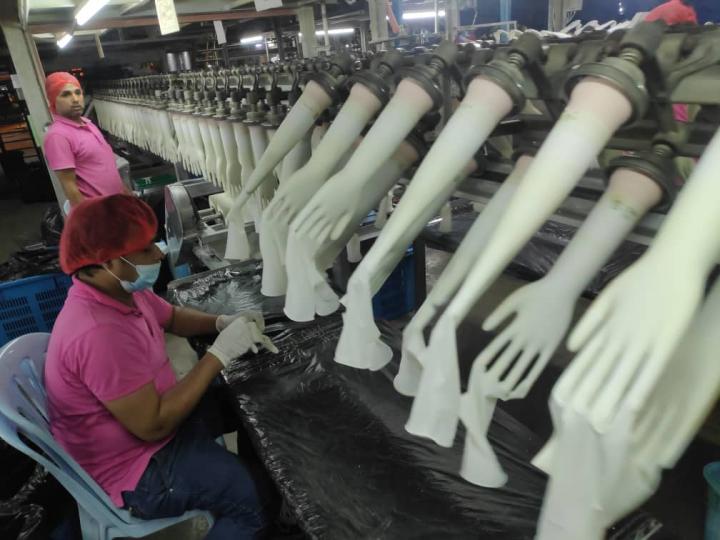
Credit: Meditech Gloves
Cranfield University researchers in partnership with Meditech Gloves, one of the leading manufacturers of high-quality examination and surgical gloves, have shown how energy savings can be made with the development of more sustainable, biodegradable, protein-free, natural rubber gloves.
More sustainable gloves, with reduced allergens
The natural rubber biodegrades 100 times faster than synthetic rubber however, its use is limited due to skin allergies caused by the presence of proteins. A special formulation of natural rubber latex can remove this problem and reintroduce natural, sustainable raw latex to the industry on a mass scale. With ambitious Net Zero carbon goals across the globe, natural latex produced by a rubber tree from atmospheric CO2 and energy from the sun is an ideal future raw material for sustainable manufacturing.
Covid-19 saw global demand for gloves surge
During the Covid-19 pandemic Meditech Gloves, based in Malaysia, doubled the production of gloves in response to the surge in demand. Worldwide, over 80 million gloves are needed by COVID-19 health response teams each month, and the global medical gloves market is predicted to be worth $70billion by 2027 . Most of the gloves produced to satisfy this surge in demand are made from petroleum-based nitrile rubber. However, most of them will end up in landfill and will remain there for about 100 years.
Dr Effendi Tenang, Company President of Meditech Gloves, said: “We are aiming to become a leader in the sustainable production of degradable, protein-free, natural rubber gloves, contributing to the reduction of CO2 and becoming a more efficient producer of highest quality medical grade gloves, to support a greener future to benefit everyone.”
Faster and more energy efficient manufacturing
Cranfield University’s initial research found that time and energy savings of up to 50% can be achieved in a revised manufacturing process, while modifying the formulation of the latex in order to deactivate the naturally occurring proteins within the original natural latex.
Currently a mannequin hand is used as a mould, dipped into a bath of natural latex rubber mixed with water which coats the ‘hand’ to produce the glove. However, significant wastage of both raw materials and energy occurs during the dipping method, the drying and curing procedure and in the energy required to support the multi-storey plant. The new formulation of the natural latex is not only eliminating the protein allergy issue but also making the process of glove manufacture faster and more energy efficient.
Sustainable products should be a Net Zero priority
Krzysztof Koziol, Professor of Composites Engineering and Head of Enhanced Composites and Structures Centre at Cranfield University, said: “The results from this research are just the beginning of this journey to improve sustainability, biodegradability and reduce production time. The planting of more rubber trees that absorb CO2 during their life, improving the environment, should become the priority in the net zero carbon efforts.”
The next phase of the Cranfield study will investigate how the natural latex raw material can be modified to rapidly enhance the biodegradability of natural rubber gloves. The university’s PhD students who worked on the research regularly access the Meditech Gloves plant in Malaysia for rapid deployment of the findings from laboratory to the real world.
###
Media Contact
Chris Leaman
[email protected]
Original Source
https:/




